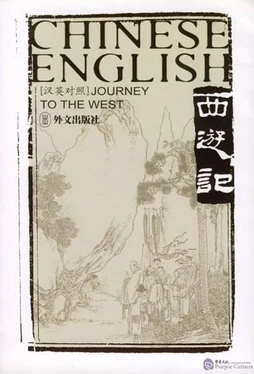The venerable elder walked forward to see that the gates were hanging crooked and falling to pieces. What he saw when he pushed the gates open chilled him to the heart:
The cloisters were deserted,
The ancient shrine left desolate.
The courtyard was overgrown with moss;
Sagebrush and brambles choked the paths.
The only lanterns came from the fireflies
While the croaking of frogs had replaced the water-clock.
The venerable elder started crying. Indeed:
The desolate halls were falling down,
The lonely cloisters collapsing.
Broken bricks and tiles lay in a dozen heaps,
And all the pillars and beams were askew.
Grass was growing all around;
The kitchens were crumbling and buried in dust.
In derelict towers the drums had lost their skins;
Broken was the glass lamp.
The color had gone from the Buddha's golden statue;
The figures of arhats lay strewn upon the floor.
Guanyin had turned to mud in the soaking rain,
Her pure vase with a willow spray fallen to the ground.
No monk was to be seen there by day,
And only foxes slept there at night.
As the wind roared with the sound of thunder
This was a place for tiger and leopard to shelter.
The walls around had collapsed
And no gates could be closed to guard it.
There is a poem about this that goes
For many a year had the temple been unrepaired;
In its derelict state it had gone from bad to worse.
The gales had destroyed the faces of the temple guardians,
And rainstorms had washed the heads off the Buddha statues.
The vajrapani had collapsed and been soaked through.
The local god had lost his shrine and stayed outside at night.
Two other things were even more depressing:
Bell and drums lay on the ground instead of hanging in their towers.
Summoning up his courage, Sanzang went in through the inner gates where he saw that the bell-tower and drum-tower had both collapsed, leaving only a single bronze bell planted in the ground, its bottom half the color of indigo. With the passage of the years the top half of the bell had been bleached in the rain while the earth's vapors had greened the lower part.
“ Bell,” Sanzang called aloud as he touched it,
“Once you roared from high in the tower,
Calling afar from the painted beam where you hung.
At cockcrow you used to ring in the dawn,
And at evening you announced the dusk.
Where now are the lay brothers who begged for the copper,
Or the craftsman who cast it to form you?
Both, I imagine, are now in the Underworld;
They have gone without trace and you are left silent.”
The venerable elder's loud sighs had by now disturbed someone in the monastery. A lay brother who was offering incense heard the voice, climbed to his feet, picked up a broken brick and threw it at the bell. The bell's clang gave the venerable elder such a fright that he fell over then scrambled up again to flee, only to trip over the root of a tree and go flying again.
As he lay on the ground Sanzang raised his head and said, “Bell,
I was just lamenting your fate
When suddenly you clanged.
On this deserted route to the West
Over the years you have turned into a spirit.”
The lay brother came over to Sanzang and steadied him as he said, “Please get up, reverend sir. The bell hasn't become a spirit. It was I who struck it just now.” Looking up and seeing how dark and ugly the other was Sanzang said, “I suppose you are a goblin or some other evil creature. I am no ordinary man. I come from Great Tang and I have disciples who can subdue dragons and tigers. If you run into them your life will be lost.”
“Don't be afraid, my lord,” replied the lay brother, falling to his knees. I'm no evil being. I'm a lay brother who looks after the incense here. When I heard those fine things you were saying just now I wanted to come out and welcome you but I was afraid that it might be some demon knocking at the gates. That was why I didn't dare come out until I'd thrown a piece of brick at the bell to calm my fears. Please rise, my lord.”
Only then did Sanzang calm himself sufficiently to reply, “Lay brother, that fright was almost the death of me. Take me inside.” The lay brother led Sanzang straight in through the third pair of gates. What the Tang Priest saw here was quite different from outside:
A cloud-patterned wall built of blue bricks,
Halls roofed with green glazed tiles.
The holy statues were sheathed in gold,
The steps made of pure white jade.
Blue light danced in the Buddha hall;
Fine vapors rose from the Vairocana chapel.
Above the Manjusri hall
Were decorations of flying clouds;
In the Library of Scriptures
Were patterns of flowers and green leaves.
On the roof above the triple eaves stood a precious jar;
In the Tower of Five Blessings embroidered covers were spread.
A thousand bright bamboos waved over the dhyana seat;
Ten thousand bluish pines threw their light on the gates.
Jade-coloured clouds reflected gold on this palace;
Auspicious clouds drifted round the woods full of purple mist.
Each morning the fragrant breezes could be smelled all around;
In the evening painted drums were heard on the high hills.
There should be morning sunshine to patch torn robes;
How can the sutra be finished by the light of the moon?
The courtyard at the back is lit by half a wall of lamps;
A column of fragrant smoke shines in the hall.
Sanzang saw this but did not dare go inside. “Lay brother,” he called, “why is the front of the monastery so dilapidated but the back so neat and tidy?”
“My lord,” said the lay brother with a smile, “these mountains are full of evil creatures and brigands. On clear days they roam the mountains to rob and on dull ones they shelter in the monastery. They knock the Buddha statues down to use as seats and burn the wooden pillars for firewood. The monks here are too feeble to argue with them, which is why they have abandoned the wrecked buildings at the front for the brigands to stay in. They have found some new benefactors to build the new monastery for them. Now there is one for the pure and one for the impure. This is how we do things in the West.”
“So that is the way things are,” said Sanzang.
As he walked further Sanzang saw written over the gate in large letters SEA-GUARDING MONASTERY OF MEDITATION. Only then did he stride in through the gates, where a monk appeared coming towards him. Just see what the monk looked like:
His hat of velvet and brocade was held with a pin,
And a pair of bronze rings hung from his ears.
His tunic was made of woolen stuff,
And his eyes were white and bright as silver.
He held in his hand a self-beating drum
As he recited scriptures in an unknown tongue.
Sanzang did not know before
That he was a lama on the road to the West.
As the lama came out he saw how very handsome and elegant Sanzang was: clear-browed and fine-eyed with a broad forehead and level top to his skull, ears hanging to his shoulders and arms so long they came below his knees. He looked like an arhat come down to earth. The lama, his face wreathed in smiles, went up to Sanzang chuckling with delight to grab hold of him, feel his hands and feet, rub his nose and tug at his ears as ways of showing his friendliness.
After leading Sanzang into the abbot's lodgings and going through the rituals of greeting the lama asked him, “Where have you come from, venerable Father?”
“I have been sent by His Majesty the Emperor of Great Tang in the East to worship the Buddha and fetch the scriptures from Thunder Monastery in India in the West,” Sanzang replied. “As we were passing this way when it was becoming dark I have come to your distinguished monastery to put up here for the night before leaving early tomorrow morning. I beg you to grant me this expeditious help.”
Читать дальше









